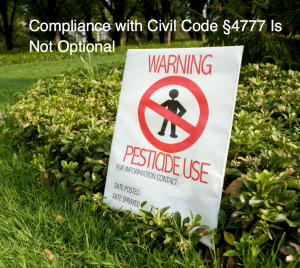 From the Community Association Attorneys at SwedelsonGottlieb
From the Community Association Attorneys at SwedelsonGottlieb
When community associations decide to have chemical pesticides or weed-killing herbicides such as Roundup applied, they must provide detailed, written advance notice to homeowners and residents.
Pursuant to Civil Code §4777(b), “an association or its authorized agent that applies any pesticide to a separate interest or to the common area without a licensed pest control operator shall provide the owner and, if applicable, the tenant of an affected separate interest and, if making broadcast applications, or using total release foggers or aerosol sprays, the owner and, if applicable, the tenant in an adjacent separate interest that could reasonably be impacted by the pesticide use with written notice…”
The Davis Stirling Act defines “authorized agent” to mean “an individual, organization, or other entity that has entered into an agreement with the association to act on the association’s behalf.” Civ. Code §4777(a)(2). The Act further defines “broadcast application” to mean “spreading pesticide over an area greater than two square feet.” Civ. Code §4777(a)(3).
So, for example, if an association’s contracted landscaper intends to apply a herbicide such as Roundup to address weeds over an area greater than two square feet (“broadcast application”), the association is obliged to provide written advance notice to homeowners or tenants of any adjacent separate interests that could reasonably be impacted by the application. This holds true for all chemical pesticides, including herbicides.
The written notice required in Civ. Code §4777(b)(1) must include the following statements and information using words with common and everyday meaning:
• the pest or pests to be controlled;
• the name and brand of the pesticide product proposed to be used; and
• the approximate date, time, and frequency with which the pesticide will be applied, along with notice that ““The approximate date, time, and frequency of this pesticide application is subject to change.”
The written notice also MUST INCLUDE THE FOLLOWING LANGUAGE:
“State law requires that you be given the following information:
CAUTION – PESTICIDES ARE TOXIC CHEMICALS. The California Department of Pesticide Regulation and the United States Environmental Protection Agency allow the unlicensed use of certain pesticides based on existing scientific evidence that there are no appreciable risks if proper use conditions are followed or that the risks are outweighed by the benefits. The degree of risk depends upon the degree of exposure, so exposure should be minimized.
If within 24 hours following application of a pesticide, a person experiences symptoms similar to common seasonal illness comparable to influenza, the person should contact a physician, appropriate licensed health care provider, or the California Poison Control System (1-800-222-1222).
For further information, contact any of the following: for Health Questions – the County Health Department (telephone number) and for Regulatory Information – the Department of Pesticide Regulation (916-324-4100).”
When applying pesticide/herbicide to the common area, such notice must be posted at least 48 hours before application in a conspicuous place in or around the common area where the pesticide is to be applied. If there are any separate interests within the vicinity of the subject common area, the Association must provide the same notice to all homeowners/tenants of those separate interests via personal delivery, first-class mail, or email (if the homeowner/tenant has provided an email address and agreed to receive communications from the Association in such a manner).
Finally, a copy of this written notice must be attached to the minutes of the Board meeting immediately subsequent the application of the pesticide. (Civ. Code §4777(b)(3)(A).)
The failure to comply with the requirements of the Civil Code could subject the association to liability for injuries not to mention having to defend the failure to comply to the owners. Be careful out there.
If you need assistance with complying with the Civil Code, feel free to contact SwedelsonGottlieb for our assistance. 1-800-372-2207 or info@sghoalaw.com
 HOA Law Blog
HOA Law Blog


